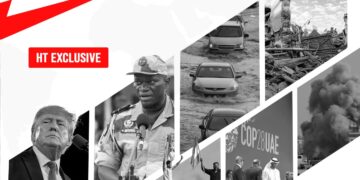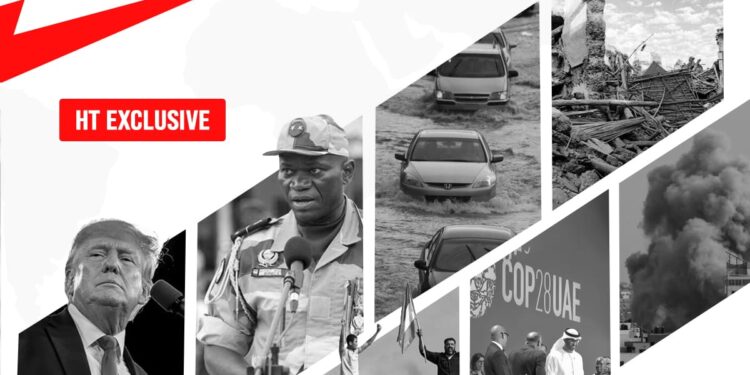By Emmanuel Nduka and Ebi Kesiena
As 2023 comes to a close, Heritage Times HT brings you 10 of the most notable global events that shaped the year.
You are not alone if you feel that 2023 had good news in short supply, especially as wars, political turmoil, natural disasters, geopolitical rivalries/competition took center stage. While new and strategic alliances were also formed, the year 2024 is already looking to pick up from where 2023 stops.
Here we go:
10. Civil War In Sudan
Sudan was wracked in civil war in 2023, a year in which the country was supposed to became a Democracy. The Sudan conflict is rooted in the protests that led the country’s military in April 2019 to overthrow longtime dictator Omar al-Bashir.
In the preceding time, an agreement was struck between the new military junta and civilian groups to share power and work toward holding elections. But in October 2021, Abdel Fattah al-Burhan, the head of the Sudanese Armed Forces (SAF), and Mohamed Hamdan “Hemedti” Dagalo, the head of the Rapid Support Forces (RSF) militia, led another coup. Fast-forward to December 2022, the two men yielded to popular pressure and agreed to lead a two-year transition back to democratic rule. While the agreement made Burhan and Hemedti co-equals and called for the RSF to be integrated into the SAF, it never lasted.
In April this year, RSF forces attacked SAF bases across the country, as efforts to negotiate a ceasefire failed. The fighting had so far claimed the lives of over 10,000 people and displaced over five million people.
9. US-China Tensions Boils Further
At the start of 2023, US-China tensions seemed to be easing. Presidents Joe Biden and Xi Jinping had a productive meeting on the margins of the G-20 summit in Bali.
US Secretary of State Antony Blinken was set to visit Beijing in February to discuss putting “guardrails” on the two countries’ increasingly tense geopolitical rivalry. But then a Chinese surveillance balloon appeared over the United States, and drifted across the country for a week before a US Air Force F-22 Raptor shot it down off the coast of South Carolina.
An angry Beijing insisted that the balloon had been blown off course while monitoring the weather, an explanation the US rejected. The incident soon inflamed political tensions between both countries, prompting Blinken to postpone his purported visit to Beijing. Most troubling was that Chinese officials refused to take US phone calls, notably from US Secretary of Defense Lloyd Austin.
However, Blinken finally travelled to Beijing in June this year for what the US State Department officials termed “constructive” talks. But those conversations did not stop Washington from imposing additional restrictions on trade with China or persuade Beijing to ease its harassment of Taiwan, the Philippines, or US military forces in Asia.
Recently in November, Biden and Xi met on the sidelines of the 2023 APEC Leaders’ Forum in San Francisco. The talks produced a few minor agreements but no major breakthroughs.
8. India Surpasses China As World’s Most Populous Country
China has had the world’s largest population for the past 100 years, but this ended in 2023, as India plenteously took over.
With an estimated population of 1.43 billion people, India will likely remain the most populous country for decades to come. China’s population is dwindling, as Demographers project that the Chinese population will fall by 100 million people by mid-century.
While countries with younger and growing populations tend to have more vibrant workforces that consume more, the Chinese government is facing increased pressure to invest in the country’s social safety net, an expensive proposition that could divert resources away from other priorities. India’s more favorable demography has spurred talk of a “demographic dividend” created by young workers serving as an engine of growth. And this could make significant, the consequences for the balance of power in the Asian continent.
7. Ukraine Gains Little Ground Against Russia, But With Heavy Cost
In early 2023, hopes were raised that a Ukrainian counteroffensive might break Russia’s hold on eastern Ukraine, and possibly Crimea. And when the counteroffensive finally began in early June, heavy casualties were inflicted on Russian troops, but the battle lines barely moved. Over the Winter and Spring seasons, Russian military prepared formidable defenses.
Recently in early November, Ukraine’s top general described the fighting as a “stalemate” and admitted that “there will most likely be no deep and beautiful breakthrough.” Russia had gained more territory over the course of the year than Ukraine had – an unlikely expected outcome. Diplomatic conversations quickly turned to whether Ukraine could sustain, let alone win a war of wear and tear that seemed to favor Russia, given its substantially larger economy and population.
But despite suffering horrific losses, Russia had double the number of troops in Ukraine in 2023 compared to the start of the invasion. Meanwhile, “Ukraine fatigue” had begun to emerge in the West, especially in the United States, as Republican lawmakers hesitated at sending more aid to Kyiv. And with long-term trends potentially favoring Russia, calls grew for Ukraine to spool from offense to defense and seek a ceasefire. While the conversation on whether President Vladimir Putin would agree to halt the fighting remains debatable, he likely believes that time is on his side.
6. Israel – Hamas Bitter War
On October 7, 2023, Israel’s world-class Intelligence and Security system was breached, as Hamas fighters evaded all hurdles, attacked Israel, killed at least 1,200 Israelis, and took over 200 hostage. The attack was the deadliest in Israel’s history.
Sadly enough, Heritage Times HT recalls that in September this year prior to the attack, the entire Middle East seemed peaceful and looked promising. This was after the Abraham Accords were deepening ties between Israel and Arab countries, even as rumors began to spread that Saudi Arabia might soon establish diplomatic relations with Israel.
Declaring in strong terms to eradicate Hamas, Israel launched hellish airstrikes against Gaza, followed by massive air, ground and water invasion of Gaza. A negotiated pause in the fighting at the end of November secured the swap release of around one hundred hostages. But fighting soon resumed with Israeli troops moving into southern Gaza, as soaring death toll for Palestinian civilians, most of them women and children, fueled worldwide complaints that Israel was committing war crimes.
Responding to the global outcry, Israel denied the charges. Its argument was that Hamas was using Palestinian civilians as human shields, especially in hospitals. Israel began bombing hospitals.
America’s Joe Biden clearly backed Israel’s right to retaliate and traveled to Israel early in the conflict to show his support. How the conflict will end and what will follow remains indefinite.
5. Donald Trump’s Indictment
Former US President, Donald Trump also made headlines in 2023. Confronted with criminal charges, Trump found himself entangled in a web of legal proceedings as he embarks on his third presidential campaign for 2024, intensifying the stakes for both him and the nation.
In the state of New York, Trump faces accusations of business fraud, allegedly conspiring to conceal reimbursements to his former lawyer and confidant, Michael Cohen. Cohen, a pivotal witness against Trump, facilitated a $130,000 “hush money” payment to adult film star Stephanie Clifford, also known as Stormy Daniels, just days before the 2016 election. The payment aimed to secure her silence regarding an alleged affair with Trump, a claim vehemently denied by the former president.
Further complicating Trump’s legal landscape, an Atlanta-based grand jury, on August 14, handed down indictments against Trump and 18 others. The charges stem from alleged endeavors to overturn Trump’s electoral defeat in 2020. Four individuals have already pleaded guilty in connection to these state charges.
This historic indictment marks the fourth legal case confronting Trump, emerging from an extensive investigation led by Fulton County District Attorney Fani Willis. The charges encompass some of the most overt attempts by Trump and his associates to influence the 2020 presidential election. Notably, unlike charges brought forth by special counsel Jack Smith, Willis’ case remains insulated from potential pardons if Trump secures reelection in 2024.
Trump’s ability to pardon himself or his associates for any state law convictions, as well as his authority to compel state-level prosecutors to withdraw charges, would be nullified. Trump, maintaining his innocence, submitted a not guilty plea through court filing, leveraging Georgia law to waive an in-court appearance.
Central to the indictment is critical evidence, including Trump’s infamous phone call with Georgia Secretary of State Brad Raffensperger. In the call, Trump urged Raffensperger to “find” the votes necessary for victory. The indictment also references the fake elector scheme and a September 2021 letter from Trump to Raffensperger, once again pressing for the decertification of Georgia’s 2020 vote. CNN previously reported that surveillance videos, text messages, and other communications unearthed during a civil case serve as crucial evidence for prosecutors investigating Trump and his allies’ efforts to overturn the 2020 election results in Georgia.
4. Devastating Earthquake In Morocco
Morocco was faced with a devastating earthquake that wreaked havoc, leaving behind a landscape of destruction and sorrow with remnants of villages reduced to ruins.
In the wake of the magnitude 6.8 earthquake that struck near Marrakech on a night into the weekend, followed by multiple aftershocks, law enforcement and aid workers, both local and international rushed to the affected region.
The earthquake’s epicenter was the Atlas Mountains, approximately 70 kilometers south of Marrakech in Al Haouz province. It inflicted severe damage on the rural landscape characterized by red-rock mountains, picturesque gorges, and glistening streams. The impact has rippled across Morocco, causing injuries and fatalities in provinces such as Marrakech, Taroudant, and Chichaoua.
At the time, the reported death toll stood at 2,946, with 1,684 casualties in Al Haouz, home to a population of around 570,000. Villages like Tafeghaghte report staggering losses, with over half the population perishing. An estimated 300,000 people have been affected, primarily speaking a combination of Arabic and Tachelhit, Morocco’s predominant Indigenous language.
The earthquake not only claimed lives, but also left a profound impact on Morocco’s historical and cultural heritage. Marrakech’s old city walls, a UNESCO World Heritage site dating back to the 12th century, now bears visible scars. Significant historical sites in the High Atlas, including mosques and pilgrimage sites were also hit.
While Morocco faces the immediate challenge of emergency response, the long-term recovery efforts in impoverished mountain regions are daunting. The government’s commitment to compensating victims and aiding in reconstruction is vital, but the challenges are expected to persist for years.
3. Ali Bongo Ousted In Gabon
On August 30, shortly after Gabon’s election commission announced that President Ali Bongo Ondimba had been elected to a third term, frustrations filled the air. This sparked a group of Gabonese military officers from the elite presidential guard unit to seize power and placed the president under arrest at his palace.
Later same day, the officers declared General Brice Oligui Nguema as Chairman of the Transition. While the election itself had been marred by reports of irregularities, the officers’ coup marks the latest in a long line of recent military takeovers across the African continent that have jeopardized regional stability and security. Mali, Niger, Guinea and Burkina Faso had all overthrew sitting presidents.
While the situation remains tenuous, it appears that the officers are consolidating their control over the country. The reign of the military has ended over five decades of Bongo family’s dynastic rule in Gabon. But what the coup leaders intend to do once they’ve cemented themselves in power remains unclear, with unspecified plans for a transition circulating amid international condemnations and demands for a return to civilian rule.
Meanwhile, the military officers who carried out the coup have established what they call the Committee for the Transition and Restoration of Institutions (CTRI). In a video address, the military officers also cancelled the election results, suspended all government institutions and closed the country’s borders. The junta leader, Nguema, has headed Gabon’s Republican Guard, an elite force responsible for protecting the president and other senior figures, since 2019.
2. Niger Coup
On July 26, the President Mohamed Bazoum-led government was overthrown. Niger and its president was taken hostage.
In a rather swift move, the Economic Community of West African States (ECOWAS) issued an ultimatum to the coup leaders, threatening military intervention if deposed Bazoum was not returned to power. As ECOWAS member states suspended relations with Niger and closed their land and air borders with the country, the governments of Mali and Burkina Faso, both led by military coup leaders, issued a joint statement warning that an ECOWAS intervention in Niger could lead to a military response from their states.
Earlier on August 20, the coup leader and self-proclaimed head of state, General Abdourahamane Tiani, presented his roadmap in a televised address. He said there would be transition period of no more than three years and an inclusive national dialogue. He also reiterated that his country would defend itself in the event of military intervention.
The Niger junta has publicly accused France, which has now began withdrawing its 1,500 troops in Niger, of trying to destabilize the country. The crisis has also been closely monitored in Washington given the presence of US military bases and political engagement in the landlocked country at the heart of the Sahel.
While Niger’s economic and social indicators place it at the bottom of global development indices, these metrics also understate the country’s strategic importance of this vast country. Its geographical position at the crossroads of North, West, and Central Africa; its mineral and oil resources; its potential for the development of renewable energies; and its strong demographic growth help explain the seemingly outsize interest of medium and large powers in the current crisis.
1. COP28’s Verdict On Fossil Fuels
The 2023 Climate Change Conference in Dubai, COP28, concluded with a groundbreaking deal urging a global shift away from fossil fuels, raising concerns about its practical implementation among participants.
The latest version of the final communique as released, featured significantly stronger language advocating for a departure from the most environmentally damaging energy sources.
And if accepted, this agreement would mark the first time such a consensus has been achieved in nearly three decades of climate change negotiations. Climate analysts affirm that this text aligns with the goal of achieving climate neutrality by the middle of the century.
While speculation surrounds the deal’s fate, hinging on the acceptance of the wording by oil-producing countries, particularly Saudi Arabia, economies like Nigeria’s’ that are heavily reliant on revenue from the oil sector, are already opposing the stance. A critical question arises: What will serve as the alternative economic driver as the world transitions to cleaner energy? Nigeria has already rejected calls for a phase-out or reduction.
The Nigerian Government has firmly opposed the proposition to phase out fossil fuels. ”It is unacceptable to ask Nigeria or Africa to phase out fossil fuels,” stated Ishaq Salako, Nigeria’s Minister of State for Environment, likening the demand to urging a sick patient to breathe without life support. Nigeria’s economy heavily relies on fossil fuels, specifically petroleum.
Fossil fuels contribute to over 75 per cent of Green House Gas (GHG) emissions, the primary cause of climate change.


































